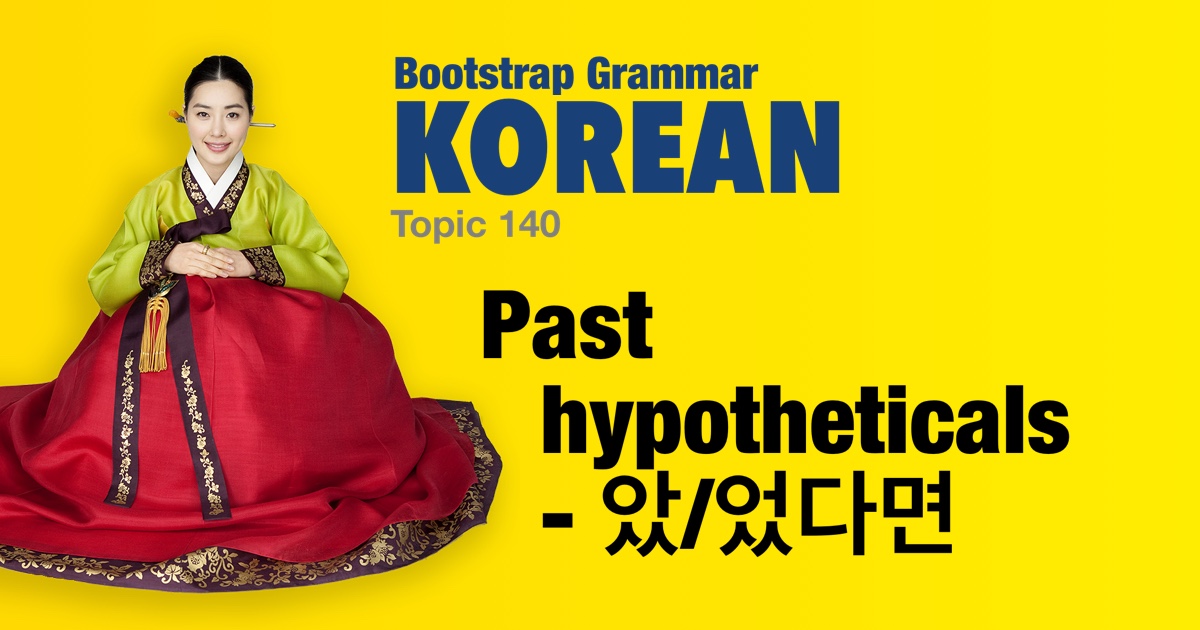Korean grammar - Past hypotheticals - 았/었다면 |
|||
|
|||
Pattern: Verb stem + 았/었다면 The present tense hypothetical 'if' pattern 다면 can be rendered into the past using Verb stem + 았/었다면. This is the same regardless of whether it is an action, descriptive or 'to be' verb. Note however that in Korean if we want to say 'If X had…then X would have' we use the future tense for the second clause. |
| Examples: | |
|
제 마음을 고백했다면 제 남자친구가 됐을 거예요.
If my heart had confessed, (he) would have become my boyfriend.
|
|
|
그가 가난했다면 여자친구가 없었을 거예요.
If he had been poor, (he) wouldn't have had a girlfriend.
|
|
|
우리가 친구가 아니었다면 외로웠을 거예요.
If we were friends, (we) would be lonely. |
|
|
고추를 안 넣었다면 맵지 않았을 거예요.
It wouldn't be spicy if (I) hadn't added chilli. |
|
|
돈을 다 쓰지 않았다면 그것을 샀을 거예요.
If (I) hadn't spent (used) all (my) money, (I) would have bought it. |
|
|
제가 사과를 다 안 먹었다면 한 개를 줬을 거예요.
If I hadn't eaten all the apples, (I) would have given (you) one. |
|
|
햇살이 그렇게 강하지 않았다면 밖에 나갔을 거예요.
If the sun hadn't been that strong, (I) would have gone outside. |
|
|
음식이 충분했다면 사람들에게 균등하게 줬을 거예요.
If there was enough food, it would have been given equally to the people.
|
|
|
그 남자가 그렇게 수상하게 행동하지 않았다면 그를 믿었을 거예요.
If the man hadn't been acting that suspiciously, (we) would have believed him.
|
|
|
열심히 공부했다면 시험에 합격했을 것이다.
If (I) had studied hard, (I) would have passed the exam. |
|
|
제가 밥을 먹었다면 배고프지 않았을 것이다.
(I) wouldn't be hungry if I had eaten |
|
|
친구를 만났다면 즐거운 시간을 보냈을 거예요.
(I) would have had a great time if (I) had met (my) friend. |
|
|
꿈이 없었다면 좌절했을 거예요.
If (I) had not had a dream, (I) would not have given up.
|
|
|
돈을 열심히 모았다면 지금쯤 여행을 갈 수 있었을 거예요.
Had (I) worked hard to save money, (I) would have been able to travel by now. |
|
|
그녀가 조금 일찍 출발했다면 차가 막히지 않았을 거예요.
(She) wouldn't have been stuck if she had left a little earlier. |
|
|
선생님의 도움이 없었다면 지금처럼 성공하지 못했을 거예요.
Without the help of the teachers, (I) would not have been as successful as (I) am now. |
|
|
친구가 도와주지 않았다면 고생했을 거예요.
(I) would have struggled if (my) friend hadn't helped (me). |
|
|
그분을 만나지 않았다면 행복하지 않았을 거예요.
(She) wouldn't be happy if (she) hadn't met that man. |
|
|
최선을 다했다면 목표를 이뤘을 거예요.
Had (I) done my best, (I) would have achieved (my) goal.
|
|
 |
|



